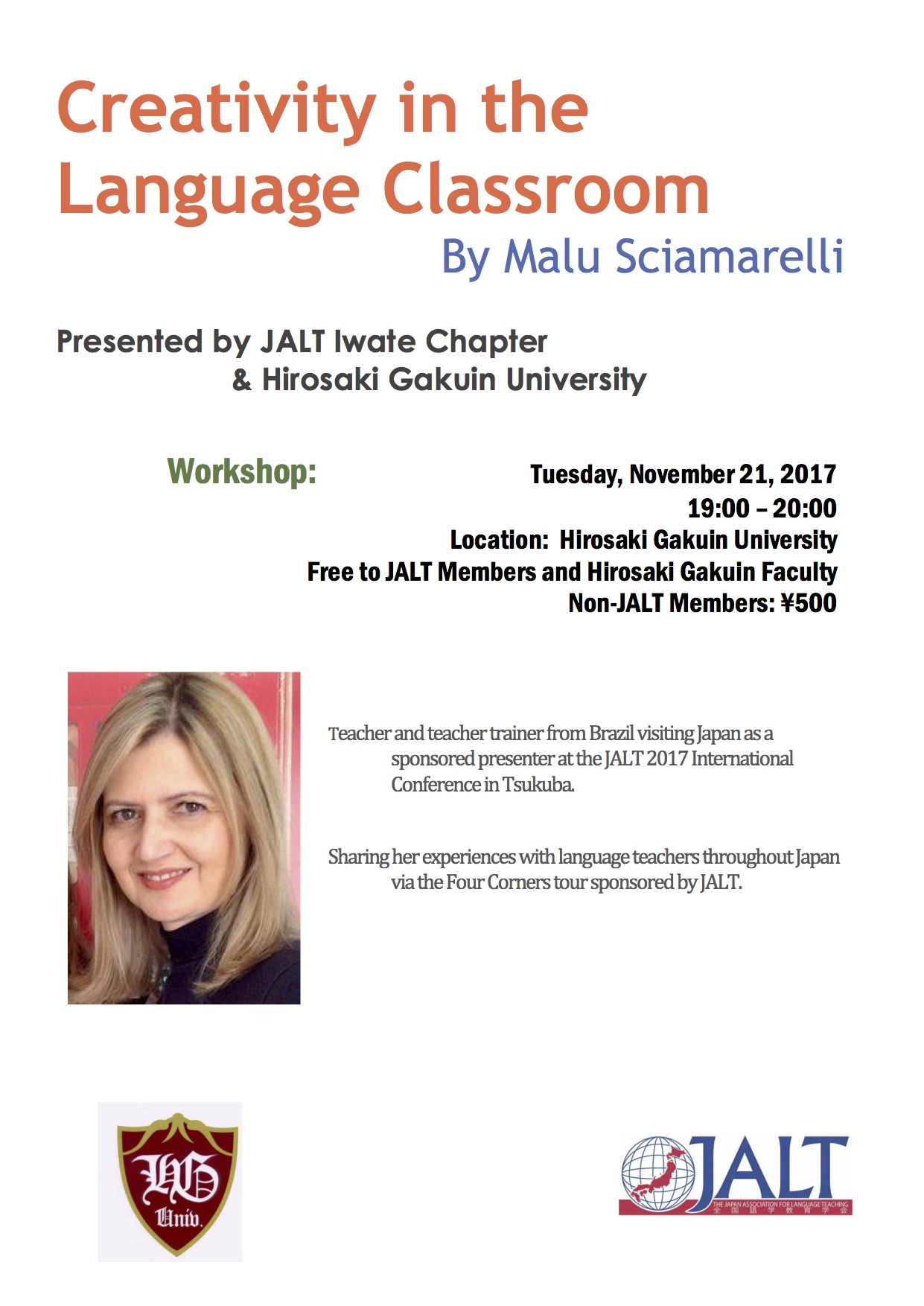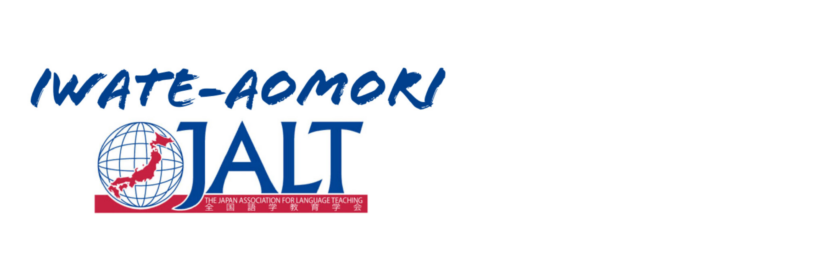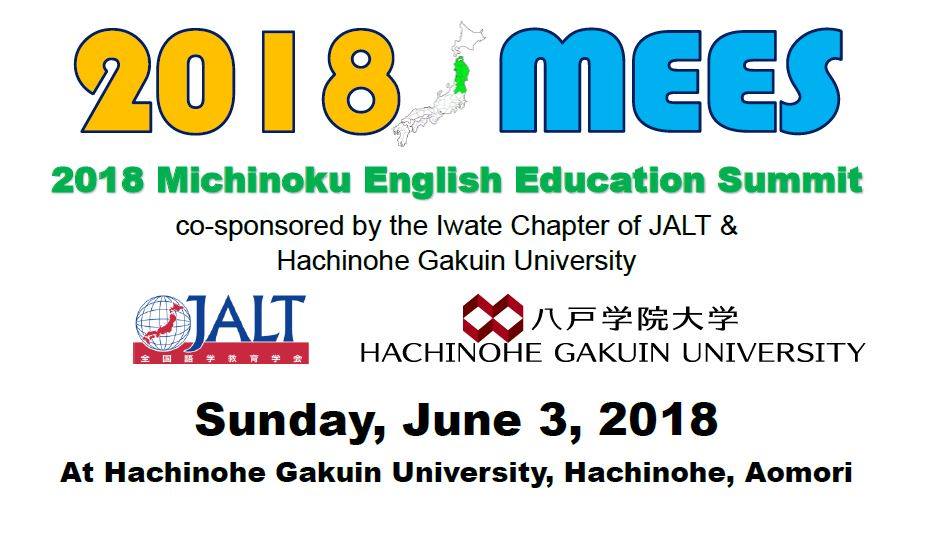___________
Date and Time: Tuesday, 21 November 2017, 19:00 – 20:00
Speaker: Malu Sciamarelli
Location: Hirosaki Gakuin University (13-1 Minorichō, Hirosaki-shi, Aomori-ken 036-8231 0172-34-5211
https://goo.gl/maps/YodneYp1gPp)
Fee for JALT members: Free
Non-JALT members: 500 yen
___________
Creativity and Playfulness in the Language Classroom
Children are driven by curiosity and playfulness. An approach based on children’s  natural way of interacting with their world, a playfulness approach, would go a long way to creating a more inclusive learning environment and more effective schools in general. However, a playfulness approach should not just be limited to school, but should be encouraged throughout a learner’s lifetime. This approach contributes to the development of problem solving, creativity, perspective taking, and the development of language.
natural way of interacting with their world, a playfulness approach, would go a long way to creating a more inclusive learning environment and more effective schools in general. However, a playfulness approach should not just be limited to school, but should be encouraged throughout a learner’s lifetime. This approach contributes to the development of problem solving, creativity, perspective taking, and the development of language.
This playfulness approach, with an emphasis on experimentation and risk-taking, inventing and failing as well as succeeding, develops our ability to learn with the skills that will allow us to build the sustainable cities, environments and societies of the future. Such an approach also encourages, accepts, and acknowledges not only the skills of the individual, but also how people share these skills with each other through the exchanging and joining of ideas and experiences.
In this workshop, we will explore how teachers can offer activities that: provide role modelling of playfulness; support and value creative thinking; lead to active engagement; and help develop the critical skills for children to learn a language through play.
Playfulness can help foster a desire for lifelong learning in our students as well as an ability to adapt throughout their lives. It provides the base for our students to be able to explore better opportunities to create and develop their own future in a global age.
(This workshop is based on my chapter “Build resilient infrastructure, promote inclusive and sustainable industrialisation and foster innovation” in the new British Council’s publication Integrating global issues in the creative English language classroom: With reference to the United Nations Sustainable Development Goals, London, 2017)
Bio
Malu Sciamarelli has been an active member of the ELT community for 24 years, working as a teacher and freelance teacher trainer in Brazil. She has also been an active member of C Group, a group of teachers dedicated to increasing the amount of creativity found in language classrooms throughout the world. She has been a committee member of the C Group for 2 years, and has published book chapters on ‘Teaching Children with Mascot-Inspired Projects’ (British Council 2015) and the importance of creativity and play in language learning (British Council 2017). Her articles on creative writing and using literature in the language classroom in several journals have helped generate a higher level of discourse around creativity in the language classroom within the ELT community. In addition, her work guest editing an issue of the ETAS Journal on ‘Creative Writing and ELT: Intersecting borders in creative writing and English language teaching’ (2014), offered a chance for new authors around the world to engage and broaden the conversation on the role creativity plays in the language classroom.
Malu Sciamarelli is also a part of a new movement in ELT, one which uses blogs and other media to quickly disseminate new ideas to the ELT community. Her posts on creativity and literature on Teaching Village, iTDi, the IATEFL Teacher Development Interest Group (TD SIG) Blog, and her own blog show her dedication to constantly engage with the community in real time and help shape the flow of ideas around the use of literature and creativity within the language classroom.
Personal Website: www.malusciamarelli.weebly.com
Twitter: @malusciamarelli
Facebook: https://www.facebook.com/malu.sciamarelli
The C Group: www.thecreativitygroup.weebly.com


 natural way of interacting with their world, a playfulness approach, would go a long way to creating a more inclusive learning environment and more effective schools in general. However, a playfulness approach should not just be limited to school, but should be encouraged throughout a learner’s lifetime. This approach contributes to the development of problem solving, creativity, perspective taking, and the development of language.
natural way of interacting with their world, a playfulness approach, would go a long way to creating a more inclusive learning environment and more effective schools in general. However, a playfulness approach should not just be limited to school, but should be encouraged throughout a learner’s lifetime. This approach contributes to the development of problem solving, creativity, perspective taking, and the development of language.